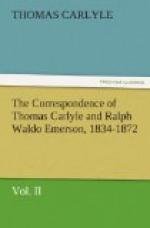---------- * The letter is missing, but a fragment of the rough draft of it exists, dated Concord, 2 October, 1848. Emerson had returned home in July, and he begins: “’T is high time, no doubt, long since, that you heard from me, and if there were good news in America for you, you would be sure to hear. All goes at heavy trot with us... I fell again quickly into my obscure habits, more fit for me than the fine things I had seen. I made my best endeavor to praise the rich country I had seen, and its excellent, energetic, polished people. And it is very easy for me to do so. England is the country of success, and success has a great charm for me, more than for those I talk with at home. But they were obstinate to know if the English were superior to their possessions, and if the old religion warmed their hearts, and lifted a little the mountain of wealth. So I enumerated the list of brilliant persons I had seen, and the [break in MS.]. But the question returned. Did you find kings and priests? Did you find sanctities and beauties that took away your memory, and sent you home a changed man with new aims, and with a discontent of your old pastures?”
Here the fragment ends. Emerson’s answer to these questions may be found in the chapter entitled “Results,” in his English Traits. ----------
Nay, there is another practical question,—but it is from the female side of the house to the female side,—and in fact concerns Indian meal, upon which Mrs. Emerson, or you, or the Miller of Concord (if he have any tincture of philosophy) are now to instruct us! The fact is, potatoes having vanished here, we are again, with motives large and small, trying to learn the use of Indian meal; and indeed do eat it daily to meat at dinner, though hitherto with considerable despair. Question first, therefore: Is there by nature a bitter final taste, which makes the throat smart, and disheartens much the apprentice in Indian meal;—or is it accidental, and to be avoided? We surely anticipate the latter answer; but do not yet see how. At first we were taught the meal, all ground on your side of the water, had got fusty, raw; an effect we are well used to in oaten and other meals but, last year, we had a bushel of it ground here, and the bitter taste was there as before (with the addition of much dirt and sand, our millstones I suppose being too soft);— whereupon we incline to surmise that there is, perhaps, as in the case of oats, some pellicle or hull that ought to be rejected in making the meal? Pray ask some philosophic Miller, if Mrs. Emerson or you do not know;—and as a corollary this second question: What is the essential difference between white (or brown-gray-white) Indian Meal and yellow (the kind we now have; beautiful as new Guineas, but with an ineffaceable tastekin of soot in it)?—And question third, which includes all: How




